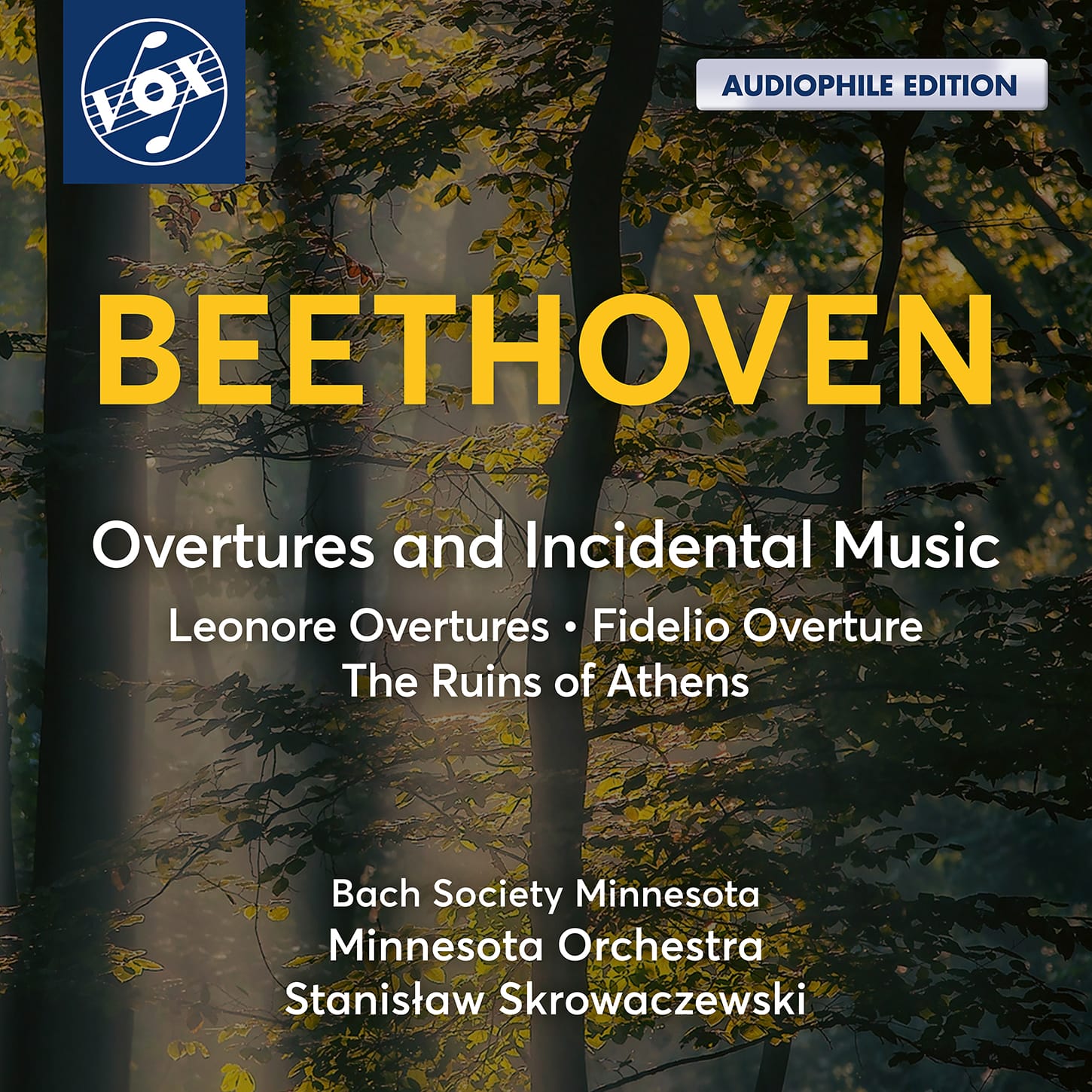Beethoven from Minnesota and Skrowaczewski
A valuable release: not only do we achieve a renewed appreciation of Skrowaczewski's art, but we hear lesser-known Beethoven in fabulous performances

We met Stanisław Skrowaczewski (1923-2017) before on Classical Explorer in performances of Mozart Piano Concertos Nos. 17 & 27 here; he's back, in classic Vox/Turnabout performances of Beethoven Overtures and Incidental Music from Minnesota. Skrowaczewski's American career was a successful one: he was invited by Georg Szell to conduct the Cleveland Orchestra in 1958, his US debut. He went on to conduct the New York Philharmonic, and the Pittsburgh and Cincinnati Symphonies before being appointed Music Director at Minnesota (then the Minneapolis Symphony) in 1960. He was with that orchestra for 19 years, recording for both Mercury and Vox. In 1984, he became the Principal Conductor of the Hallé Orchestra, following on from James Loughran. He was known also as a composer, and his Bruckner was often revelatory (a live Bruckner 7 with the LPO is long lodged in my memory, and is also available on the orchestra's record label).
It is such a joy to have the three Leonore Overtures in one place, one after the other. Leonore, of course, was the original version of what became Fidelio: we reviewed an Orfeo Leonore here, and Fidelio on a DVD/Bluray from Covent Garden here, plus a live performance of Fidelio in a production by David Bobée with Insula under Laurence Equilbey at the Barbican.
As so often with Beethoven, numberings are misleading: Leonore Overture No. 1 dates 1806/7, No. 2 from 1804/5 and No. 3 (the most familiar of the three) 1806. All three Leonore's include the melody of Florestan's aria, ‘In des Lebens Frühlingstagen”. No. 1 stands apart from the similar-pair Nos. 2 and 3 - it is substantively shorter (just under 10 minutes as opposed to 14-plus minutes). It has a concision lacking in No. 2, something Skrowaczewski is at pains to underline:
The sound is wonderful (the production date is 1980, which would make these late recordings from Minnesota as he officially ended his position in 1979).
Leonore 1 was not performed until some nine years after Beethoven's death, and it carries the opus number 138. Leonoers Nos. 2 & 3, to increase the confusion, are Op. 72 a and b respectively. There is no doubting No. 3 is tauter, but No. 2 seems to breathe the theatre viscerally. And there's no doubt Stan believes in it; he also revels in teh dramatic stroke of the arrival footed trumpet fanfares (which in the opera herald teh arrival fo the situation's saviour, Don Fernando). As a point of interest and further reference, I include both this Turnabout performance and a more recent performance from Japan in which Skrowaczewski conducted the NHK Orchestra, from February 1986 (click this link):
... and so to the most familiar of the three, the mini-tone poem that is Op. 72b. This is a performance of great breadth, one of held-breath pianissimi (rendered breathtakingly thanks to the 192 kHz / 24-bit high def transfers of the original analogue master tapes) married to compelling dynamism. The sound of the Minnesota Orchestra is lithe, rhythms are buoyant:
When it comes to the overture we know from the opera house, Fidelio, Skrowaczewski is interesting as he takes the slow sections so slowly the piece takes on symphonic breadth. Suddenly, it doesn't feel so slight - neither does it feel the odd man out amongst the Leonore's!. Horn players will enjoy the expertise of the second horn player who launches the allegro with the horn solo (it's not the first!). I wonder who it was?. String articulation is absolutely on point; wind might sound a bit thin but have all the ensemble work down:
The disc lasts just a tad under an hour. More music for the theatre, this time for a play, completes the programme: music from The Ruins of Athens, Op. 113 (1811, Die Ruinen von Athen in the original German). Some might know the music from Liszt's fantasia for piano and orchestra, which is included below. Here's the Overture, a lovely piece. listen out for the fabulous oboe and bassoon duets:
I still just prefer Kurt Masur with the Leipzig Gewandhaus Orchestra here, from their first Beethoven Cycle (on Philips LPs):
.. .and, sticking with Masur and the Gewandhaus, here's Muchel Béroff as piano soloist in the Liszt Fantasia on Themes from the Runs of Athens, S. 122, with rolling score:
When it comes to the famous “Turkish March,” it is certainly good to hear it in the original orchestral version, especially one such as this, with Skrowaczewski inspiring the Minnesotans to great heights. No doubting the local colour in the percussion section!:
Beethoven wrote a fine set of variations on this, his Op. 76. Let's go a little off-piste for our choice in performer here: Sviatoslav Richter, recorded in the studio, in Salzburg, 1970:
And finally, another march: the March and Chorus in E flat, “Schmückt die Altare” (the usual English translation is “Twine Ye Gardens”). Both the March and Chorus, and the Turkish March appear as material for Liszt's piece move, incidentally. The chorus used for this recording is the Bach Society of Minnesota, in fine voice:
A valuable release in several respects: not only do we achieve a renewed appreciation of Skrowaczewski's art, but we hear lesser-known Beethoven in fabulous performances, skilfully restored.
